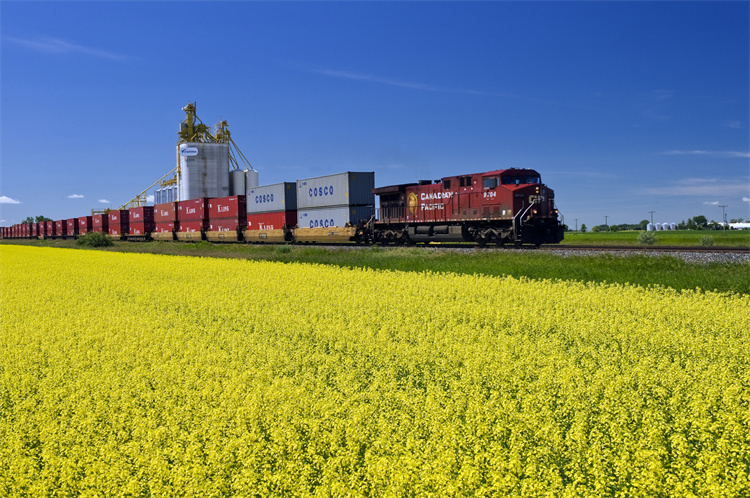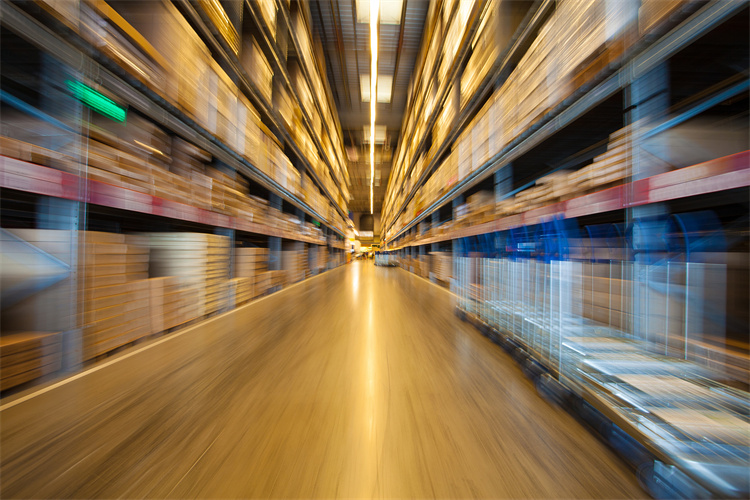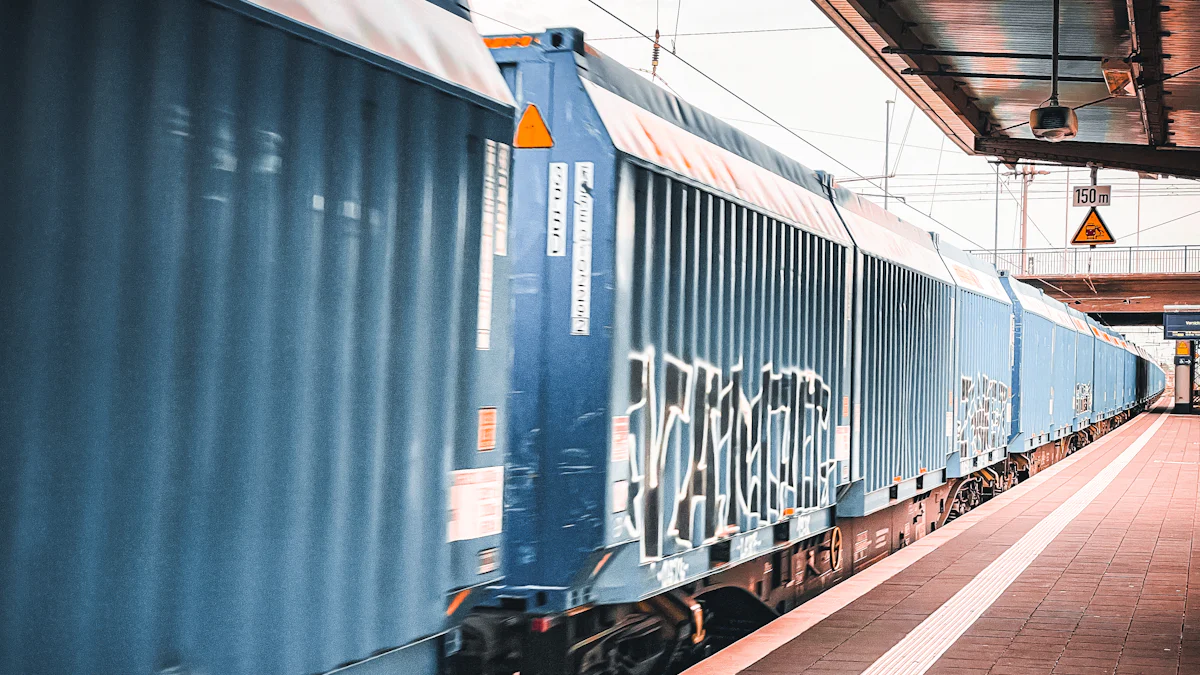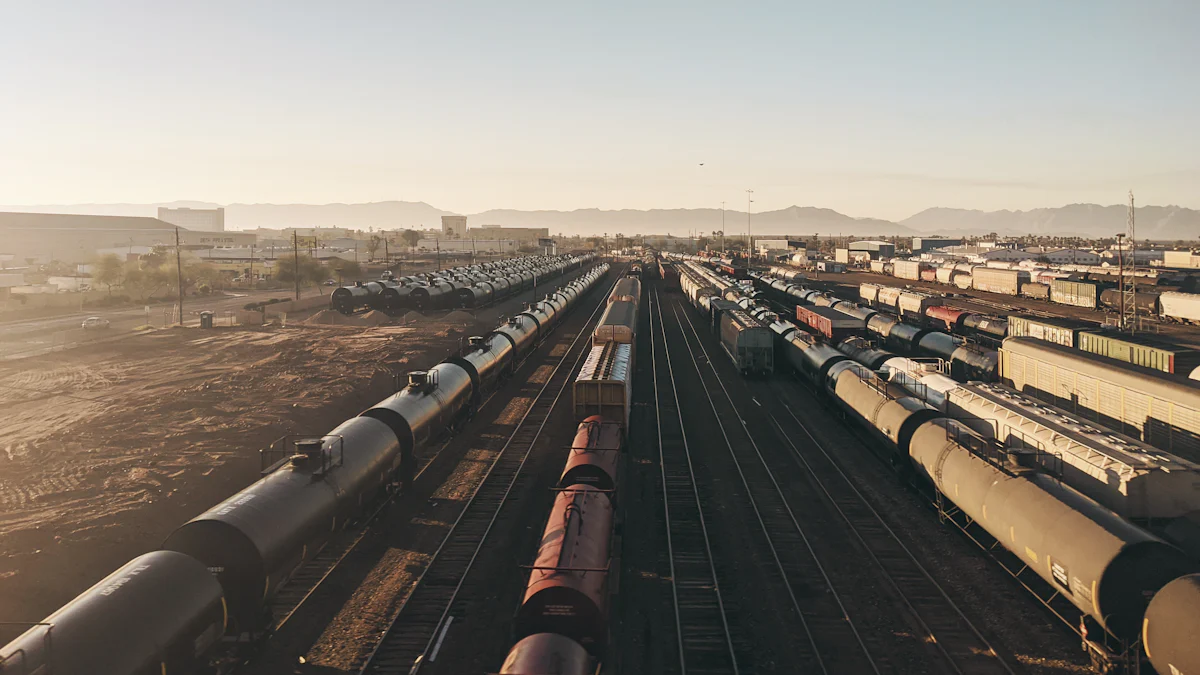Next Wave of Rail Logistics: India's Vision

Rail logistics forms a crucial backbone for India's economic growth. The sector supports the movement of goods across vast distances. Recent trends show a decline in rail freight share, dropping from 39% in 2002-03 to 27% in 2014-15. However, the next wave of advancements promises a transformative impact. Electrification and capacity augmentation aim to increase rail freight share to 40% by 2050. This shift could reduce road congestion and lower CO2 emissions significantly. Companies like JUSDA offer comprehensive solutions, enhancing efficiency through strategic partnerships and advanced monitoring capabilities.
Current State of Rail Logistics in India
Overview of the Existing Infrastructure
Rail Network and Connectivity
India boasts one of the largest rail networks in the world. The network spans over 67,000 kilometers, connecting remote regions with major urban centers. This extensive connectivity facilitates the movement of goods across the country. The railways, introduced during British rule, initially covered a mere 21 miles from Bombay to Thane. Over time, the network expanded significantly, contributing to economic development and growth.
Current Capacity and Utilization
The current capacity of India's rail logistics sector faces challenges. The infrastructure struggles to meet the growing demand for freight transport. Utilization rates remain high, often leading to congestion and delays. The introduction of electrified lines aims to enhance capacity, allowing trains to carry heavier loads at higher speeds. This improvement will address current limitations and boost efficiency.
Challenges Facing the Sector
Infrastructure Bottlenecks
Infrastructure bottlenecks pose significant challenges to rail logistics in India. Many tracks require upgrades to support modern freight demands. Aging infrastructure limits the speed and efficiency of cargo movement. Investment in new tracks and technology is crucial to overcoming these obstacles. The government's ambitious investment plan of ₹7 trillion aims to address these issues.
Regulatory and Policy Issues
Regulatory and policy issues also hinder the growth of rail logistics. Complex regulations and bureaucratic processes slow down operations. Streamlining policies and implementing reforms will create a more conducive environment for growth. The National Rail Plan 2030 seeks to identify new corridors and improve regulatory frameworks.
Recent Developments and Initiatives
Government Policies and Investments
The Indian government has initiated several policies to revitalize rail logistics. Significant investments focus on upgrading infrastructure and enhancing freight services. The development of dedicated freight corridors marks a major advancement. These corridors will span approximately 4,300 kilometers, improving the efficiency of cargo movement.
Private Sector Involvement
The private sector plays a vital role in the evolution of rail logistics. Companies like JUSDA offer comprehensive solutions for international and domestic markets. JUSDA's services include full-container and less-than-container-load options via China-Europe block trains. Their strategic partnerships ensure stable carriage capacity and efficient operations. Advanced monitoring capabilities provide real-time tracking of cargo conditions. This involvement enhances the overall efficiency and reliability of rail logistics in India.

JUSDA Solutions
To provide you with professional solutions and quotations.
Opportunities for Growth and Innovation
Technological Advancements
Digitalization and Automation
Digitalization transforms the logistics sector by enhancing productivity and efficiency. The logistics industry adopts digital technologies to optimize operations. Automation streamlines processes, reducing manual intervention. Real-time tracking improves supply chain visibility. Data analytics provides insights into logistics performance. These advancements reduce costs and improve customer service. JUSDA leverages digital solutions for efficient rail transport. Their services include real-time monitoring of cargo conditions. This capability ensures timely and accurate information flow.
Smart Logistics Solutions
Smart logistics solutions revolutionize freight management. Advanced technologies enable seamless integration across networks. Intelligent systems optimize route planning and scheduling. Predictive analytics anticipates demand fluctuations. JUSDA offers temperature-controlled containers for sensitive cargo. These containers maintain optimal conditions during transit. Strategic partnerships ensure stable carriage capacity. Customized special trains cater to specific logistics needs. JUSDA's extensive network supports international and domestic routes.
Market Trends and Demand Drivers
Increasing Freight Demand
Freight demand in India continues to rise. Economic growth fuels the need for efficient logistics. Industrial expansion drives increased cargo movement. Rail logistics plays a pivotal role in meeting this demand. Electrification enhances train speed and load capacity. Dedicated freight corridors improve cargo movement efficiency. JUSDA handles over 10,000 standard containers annually. Their services cover more than 30 countries worldwide.
Global Trade and Export Opportunities
Global trade presents significant opportunities for rail logistics. India's strategic location facilitates international commerce. Export activities require reliable logistics solutions. Rail transport offers cost-effective options for long-distance trade. JUSDA specializes in Eurasian sea-rail intermodal transport. Their network spans China-Europe, China-Russia, and other routes. Fast customs clearance ensures efficient cargo transfers. Energy-saving practices align with global sustainability goals.
India's Vision for the Future of Rail Logistics

Strategic Goals and Objectives
Enhancing Efficiency and Sustainability
Indian Railways aims to enhance efficiency in freight transport. Electrification of railway lines will increase train speeds and load capacities. This initiative will reduce transit times and operational costs. The National Rail Plan 2030 targets net-zero carbon emissions. Energy-efficient practices will contribute to environmental sustainability.
Expanding Network and Capacity
Expansion of the rail network remains a priority. New tracks will accommodate increasing freight demand. The government plans to invest ₹7 trillion in infrastructure upgrades. This investment will support capacity augmentation. Enhanced connectivity will facilitate seamless cargo movement.
Key Projects and Initiatives
Dedicated Freight Corridors
Dedicated freight corridors represent a transformative project. These corridors will span approximately 4,300 kilometers. The corridors will improve the efficiency of cargo movement. Electrified tracks will allow faster and heavier freight trains. This development will lower transportation costs.
High-Speed Rail Projects
High-speed rail projects will revolutionize logistics. These projects will focus on reducing travel time for freight. Increased speed will enhance the competitiveness of rail transport. The government plans to procure new trains for these projects. Investment in high-speed rail will boost overall capacity.
Role of Public-Private Partnerships
Collaborative Models
Public-private partnerships will drive innovation in rail logistics. Collaboration between government and private entities will enhance service delivery. Companies like JUSDA offer comprehensive logistics solutions. JUSDA's strategic partnerships ensure stable carriage capacity. These partnerships will improve the reliability of rail services.
Investment Opportunities
Investment opportunities abound in the rail sector. Private sector involvement will accelerate infrastructure development. JUSDA's extensive network covers over 30 countries. Their expertise in multimodal transport offers valuable insights. Investment in rail logistics will yield significant returns.
Next Wave of Rail Logistics

Next Wave of Technological Integration
Electrification and Speed Enhancements
The Indian rail logistics sector is undergoing a transformation with electrification. Electrification enhances train speeds and load capacities. This improvement reduces transit times and operational costs. The government plans to electrify more railway lines. This initiative aligns with India's sustainability goals. Electrified trains consume less energy and emit fewer pollutants. The National Rail Plan 2030 supports these advancements. The plan aims to increase the average speed of freight trains. Faster trains improve the efficiency of cargo movement. JUSDA's rail transport services benefit from these enhancements. Their network spans over 30 countries, ensuring efficient operations.
Real-Time Monitoring and Tracking
Real-time monitoring revolutionizes rail logistics. Advanced tracking systems provide accurate cargo information. These systems monitor temperature, humidity, and other conditions. JUSDA offers real-time tracking for its rail services. This capability ensures timely and precise data flow. Monitoring enhances supply chain visibility and reliability. Customers receive updates on cargo status throughout the journey. Real-time tracking reduces the risk of delays and losses. JUSDA's strategic partnerships guarantee stable carriage capacity. This stability supports seamless cargo movement across networks.
Next Wave of Policy and Strategic Initiatives
National Rail Plan 2030
The National Rail Plan 2030 outlines strategic goals for rail logistics. The plan focuses on enhancing efficiency and sustainability. Electrification and capacity augmentation are key objectives. The government aims to expand the rail network significantly. New tracks will accommodate growing freight demand. The plan targets net-zero carbon emissions by 2030. Energy-efficient practices contribute to environmental goals. The National Rail Plan supports the development of dedicated freight corridors. These corridors improve the efficiency of cargo movement. The plan also addresses regulatory and policy issues. Streamlined processes create a conducive environment for growth.
'Truck on Train' Service
The 'Truck on Train' service represents an innovative approach. This service integrates road and rail logistics seamlessly. Trucks are loaded onto trains for long-distance transport. This method reduces road congestion and transit times. The Dedicated Freight Corridor Company of India Limited launched this service. The service enhances the efficiency of freight movement. Rail transport offers cost-effective options for long hauls. JUSDA specializes in multimodal transport solutions. Their services include international and domestic routes. The 'Truck on Train' service aligns with JUSDA's offerings. This integration supports comprehensive logistics solutions.
India's vision for rail logistics focuses on efficiency, sustainability, and capacity expansion. The next wave of advancements will transform the sector with technological integration and strategic initiatives. Rail freight will reduce logistics costs and carbon emissions. Dedicated freight corridors will enhance transit efficiency. JUSDA's comprehensive rail services support this transformation. Their strategic partnerships ensure reliable operations. India's commitment to rail logistics will drive economic growth and environmental sustainability. The future of rail logistics in India holds promising prospects for a competitive and resilient economy.
See Also
Revolutionizing Logistics: AI's Impact on Future Supply Chains
Unlocking AI's Power: Revealing Logistics Potential
Future Forward: Exploring Breakthroughs in Logistics Tech
Navigating the Future: Logistics Enhanced by Digital Tech
2024 Innovations: Revealing the Future of Sea Freight Logistics
